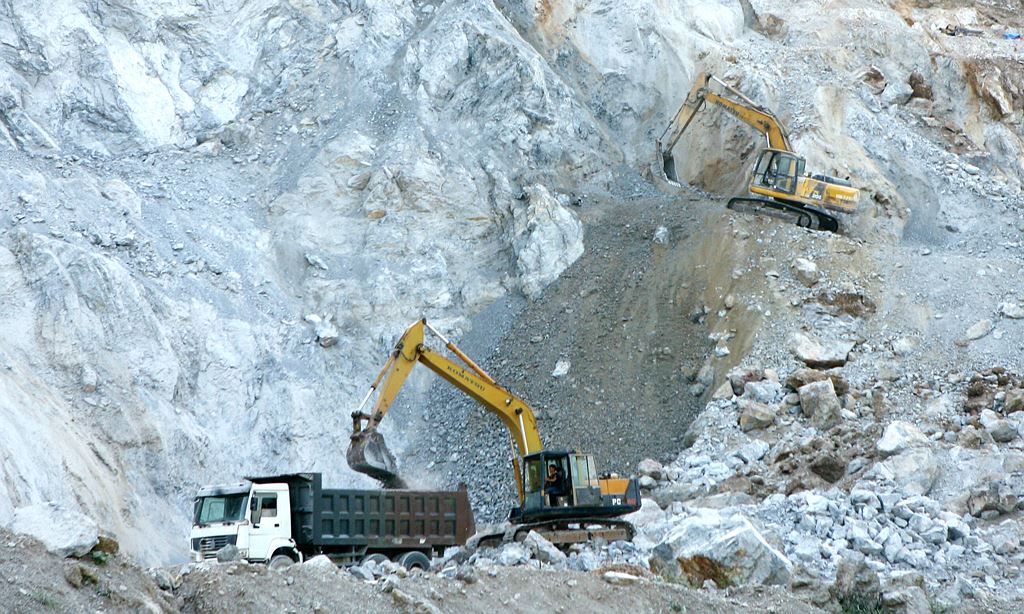What is mineral activity? Areas banned from mineral activities in Vietnam
What is mineral activity? What are the areas banned from mineral activities in Vietnam? - Ngoc Nhu (Tra Vinh, Vietnam)

What is mineral activity? Areas banned from mineral activities in Vietnam (Internet image)
1. What is mineral activity?
Mineral activities include mineral exploration and mineral mining activities.
In which:
- Mineral exploration means activities to identify mineral deposits and quality and obtaining other information for mineral mining.
- Mineral mining means activities to recover minerals, including mine infrastructure construction, excavation, classification, enrichment and other related activities.
(Clause 5, 6, 7, Article 2 of the Mineral Law 2010)
2. Principles of mineral activities in Vietnam
The principle of mineral activity includes:
- Mineral activities must be conformable with mineral strategy and planning, plan for protection, exploration, extraction and use of minerals in the provincial planning, and associated with protection of environment, natural landscapes, historical and cultural sites/movements, scenic landscapes and other natural resources, and assurance of national defense, security and social order.
- Only mineral activities are allowed when the competent state management agency is authorized.
- Minerals exploration must fully evaluate the reserves and quality of minerals in the exploration area.
- Minerals must take socio -economic efficiency and environmental protection as a basic standard for investment decision; Applying advanced exploitation technology, suitable to the size and characteristics of each mine and minerals to maximize mineral recovery.
(Article 4 of the Mineral Law 2010, amended by Clause 2, Article 8 of the Law amending a number of articles of 37 Laws related to planning 2018)
3. Mineral activity areas in Vietnam
- An area where mineral activities area carried out is an area where a geological baseline survey of minerals is carried out and is delineated by a competent authority in relevant planning in accordance with regulations of the law on planning.
- Based on requirements for national defense and security assurance; prevention and mitigation of impacts on the environment, natural landscape and historical-cultural relics; protection of special-use forests or infrastructure facilities, mineral exploration and mining may be restricted in terms of:
+ Organizations and individuals allowed to conduct exploration and mining;
+ Mining output;
+ Mining duration;
+ Mining areas, depth and methods.
Competent licensing state management agencies specified in Article 82 of the Mineral Law 2010 shall decide on forms of restriction of mineral activities at the request of ministries and ministerial-level agencies.
(Article 26 of the Mineral Law 2010, amended by Clause 2, Article 8 of the Law amending a number of articles of 37 Laws related to planning 2018)
4. Areas banned from mineral activities in Vietnam
Areas banned from mineral activities include:
- Land areas with historical-cultural relics or scenic places already ranked or delimited for protection under the Law on Cultural Heritages;
- Land areas under special-use forests, protection forests or land areas planned for protection forests and geological conservation zones;
- Land areas which are planned for national defense or security purposes or in which mineral activities may affect the performance of defense or security tasks;
- Land areas used by religious institutions;
- Land areas within the protection corridors or zones of transport, irrigation or dike works; water supply and drainage and waste treatment systems, electricity transmission lines, petrol, oil or gas pipelines or communications systems.
(Clause 1, Article 28 of the the Mineral Law 2010)
5. Areas temporarily banned from mineral activities in Vietnam
Areas temporarily banned from mineral activities shall be delimited for any of the following reasons:
- Satisfying defense or security requirements;
- Conserving the nature, historical-cultural relics or scenic places which are considered by the State for recognition or discovered in the process of mineral exploration or mining;
- To prevent or remedy consequences of natural disasters.
(Clause 2, Article 28 of the Mineral Law 2010)
Nguyen Thi Diem My
- Key word:
- mineral activities in Vietnam
- Cases of land rent exemption and reduction under the latest regulations in Vietnam
- Economic infrastructure and social infrastructure system in Thu Duc City, Ho Chi Minh City
- Regulations on ordination with foreign elements in religious organizations in Vietnam
- Increase land compensation prices in Vietnam from January 1, 2026
- Determination of land compensation levels for damage during land requisition process in Vietnam
- Who is permitted to purchase social housing according to latest regulations in Vietnam?
-

- Notable new policies of Vietnam effective as of ...
- 16:26, 11/04/2025
-
.Medium.png)
- Notable documents of Vietnam in the previous week ...
- 16:21, 11/04/2025
-
.Medium.png)
- Notable documents of Vietnam in the previous week ...
- 16:11, 02/04/2025
-
.Medium.png)
- Notable new policies of Vietnam to be effective ...
- 16:04, 02/04/2025
-
.Medium.png)
- Notable new policies of Vietnam effective from ...
- 14:51, 21/03/2025
 Article table of contents
Article table of contents
